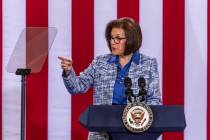EDITORIAL: Obama’s ideal retirement age runs afoul of his policies
President Barack Obama’s administration is all about social media. So it’s never a surprise when any of the president’s three Twitter feeds — @WhiteHouse, @BarackObama and @OFA (the last two are run by Organizing for Action) — promote his words and deeds. It’s equally unsurprising how often these tweets reveal a president and an administration completely out of touch with the country.
Last week, @WhiteHouse tweeted an excerpt from a speech the president gave in Kansas City, Mo.: “What I really want is somebody who has worked for 20, 30 years being able to retire with some digity [sic] and respect.” Yes, the tweet misspelled “dignity.” Perhaps the person charged with posting that comment thought the idea was so awesome it merited a “hot diggity.”
Typos aside, the comment was roundly and wittily criticized on Twitter. Lachlan Markay of the Washington Free Beacon tweeted: “Maybe if someone who’s worked for 20 years can’t yet retire ‘with some dignity,’ they shouldn’t retire at 42.”
Indeed, the president’s remark speaks to the huge conflicts in Obama administration policies as they relate to retirement. It’s the height of absurdity to argue that those who work, regardless of skill level, should be able to stop working in their 40s or 50s. For starters, moving up the retirement age for Social Security would bust the insolvent entitlement even sooner. Moreover, the president’s dream would require taking almost everyone out of the workforce when they are in the prime of their careers and just beginning to realize peak earning power.
Those in their 40s and 50s comprise most of the leaders in this country, in all sorts of business capacities. The idea that middle age is the perfect time to retire shows the incredible disconnect between the president — whose entire life has revolved around government and academia — and the way the real world works. As the more anonymous @bimbim1 tweeted: “This group’s experience is grad school until their 30s, government job until 50s. 20 years sounds about right to them.”
For argument’s sake, if the president really wanted to make early retirement possible for most Americans, there are things he could do — if he weren’t crushing the private sector. The president and Democrats are against privatizing Social Security benefits by creating individual investment accounts, but they’re all in for keeping public-employee pensions in the same risky investments they criticize, creating billions of dollars in liabilities for state and local governments (read: taxpayers). The president also could support pro-growth economic policies that would increase wages and allow people to save more for retirement. He could lead the charge to cut the industrialized world’s most punitive corporate tax rate, reform the income tax code and dial back the job-killing mandates of Obamacare. But the president is against doing any of those things. In fact, he’s prepared to further punish corporations that want to escape his economic policies and move to friendlier business climates.
President Obama doesn’t have to worry about retiring with some dignity. The taxpayers will take care of him. But the fact that he put this idea out there, flying in the face of reality and all the policies he champions, shows that voters should have retired him two years ago. He would have been 51 at that point — a perfect retirement age, by his own delusional standard.























